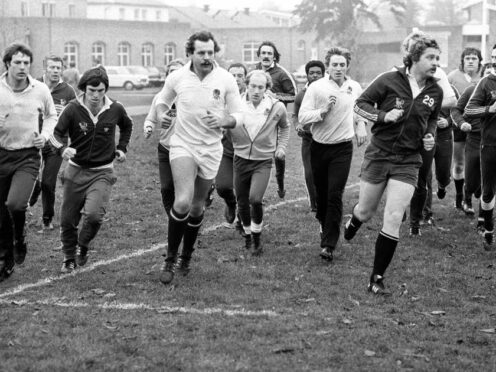When players were notified by letter of their selection for England’s tour to Japan in 1979 it included a request from the Rugby Football Union which demanded “please don’t forget your passports”.
On Saturday, for the first time since the amateur era, England will play in Japan against the host nation – and the sport is unrecognisable from 45 years ago when Bill Beaumont took his squad on an adventure that also included visits to Fiji and Tonga.
The planning overseen by Steve Borthwick for the first official Test between the nations on Japanese soil has been meticulous, featuring encyclopaedic dossiers compiled on opposition players and a ‘heat camp’ to prepare for the humidity of Tokyo. But 1979 was very different.
Among Beaumont’s touring party was referee Clive Norling, who had been chosen by the RFU and was to take charge of five of the seven matches that made up the itinerary. According to England’s 29-cap Lions wing Peter Squires, it was not the advantage it might seem.

“It wasn’t considered it too much of an issue because he was Welsh! Clive was a decent bloke and he had a good sense of humour. That was quite important if he was to fit in with us,” Squires told the PA news agency.
Squires, at the time a 27-year-old PE teacher at Harrogate Grammar School, came to England’s rescue in the first game against Japan by scoring a crucial injury-time try that was converted by Dusty Hare, preventing a seismic upset.
The Ripon RFC stalwart’s recollection of that 21-19 victory in Osaka might be hazy – match footage to jog the memory is in short supply – but the joy of touring in an era when only expenses were paid remains vivid.
“Every time you were picked to play for England it was very special and the tours were a real bonus. Those trips felt out of this world,” he said.

“Not only were you playing for England, but you were going to places like Fiji, Tonga and Japan. My normal summer holiday was not to Fiji, Tonga and Japan… more like Bridlington or Scarborough!
“You didn’t think too much about the money. You had your expenses which included an allowance for three telephone calls home a week. It was totally and absolutely amateur.
“I remember the bullet train in Japan… we didn’t have too many bullet trains around Ripon and Northallerton.
“There was quite a bit of socialising, but mainly the night after the game. That was always lively and so it should be, but we got the balance right. We were playing for England and we had to perform for our country.”

Beaumont’s England were the first major nation to visit Tonga and while they emerged 37-17 winners from their historical clash in Nukuʻalofa, preventative measures had to be taken earlier in the day.
“An hour before the game we had a wander around the pitch and it was absolutely rock hard. There was a rugby field, but there was no stand,” said Squires, who also played 49 first-class matches for Yorkshire CCC as an opening batsman.
“The non-players for that day were assigned to go out and pick up the stones that were on the pitch and put them on the side. It was totally different to what we were used to.
“The heat in Fiji a few days earlier was extreme, really hot. The pitches were rock hard. Everybody there played rugby of some sort, it’s just what they do. It was all such a fantastic experience.”
